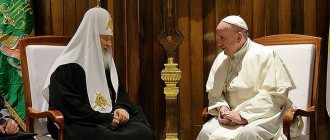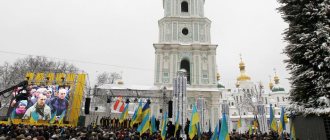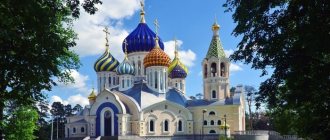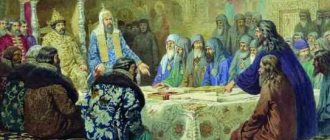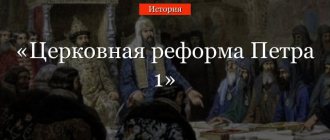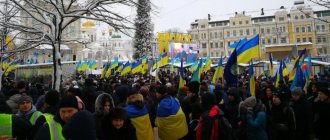History of the conflict
On October 19, 2021, the Patriarchate of Constantinople stated that it continues to be in communion with the Russian Orthodox Church (ROC). Earlier on October 15, the Russian Orthodox Church announced the severance of Eucharistic communion with Constantinople. This was a response to his cancellation of the decision made in the 17th century to transfer the Kyiv Metropolis under the jurisdiction of the Moscow Patriarchate. About the history of the conflict and the positions of the churches - in the material of Kommersant.
How many Orthodox churches are there in Ukraine
Currently, there are three large Orthodox church organizations operating on the territory of Ukraine - the Ukrainian Orthodox Church of the Moscow Patriarchate (UOC-MP), as well as the canonically unrecognized Ukrainian Orthodox Church of the Kyiv Patriarchate (UOC-KP) and the Ukrainian Autocephalous Orthodox Church (UAOC).
Where it all started
UOC MP
headed by the Metropolitan of Kyiv and All Ukraine, it was established in 1990 by the Council of Bishops of the Russian Orthodox Church as an independent and independent church within the Moscow Patriarchate. Since 2014, its primate has been Metropolitan Onuphry.
UOC KP
formed in 1992 after an unsuccessful attempt by the then head of the UOC-MP, Metropolitan Philaret (Denisenko), to achieve complete independence of the Ukrainian church (autocephaly). Filaret did not obey the demand of the Russian Orthodox Church to leave his post, as a result of which he was defrocked. In the same year, with the support of the Ukrainian authorities, he created and legally registered the so-called Kiev Patriarchate. In 1997, the Russian Orthodox Church excommunicated Filaret from the church and anathematized him.
UAOC
traces its history back to 1917, when part of the Orthodox clergy in Ukraine advocated the creation of an independent church. At the initial stage, the Soviet government supported the UAOC, trying to weaken the Russian Orthodox Church, but already in the late 20s, persecution of activists began. In 1930, the UAOC announced self-dissolution: part of the clergy was physically destroyed, some emigrated. In 1989, the UAOC resumed legal activities in Ukraine.
Current situation
On the eve of Euromaidan, the representation of the Ukrainian Orthodox Church MP prevailed in most regions.
Currently, the UOC-MP continues to control the majority of parishes, but divisions are occurring in a number of communities. In October 2016, Archbishop of the UOC-KP Evstratiy Zorya stated that within two years the UOC-MP had lost more than 39 parishes that came under the jurisdiction of the Kyiv Patriarchate. Previously, religious scholar Viktor Yelensky estimated the number of “transitions” at 60–70 parishes. “The tendency is this: in cases where a priest behaves, say, in an anti-Ukrainian manner, such transitions are not rare,” Mr. Yelensky said.
Positions of the parties
Patriarch of Moscow and All Rus' Kirill:
“They are trying to drag the Ukrainian church into a deep conflict that divides society, and make it a hostage of this conflict... Violent seizures of churches are taking place, court decisions are being ignored, a slanderous information campaign is being waged against the church, bills are being proposed in the Ukrainian parliament, the purpose of which is to discriminate and put people in the most difficult conditions. the largest religious community in the country... Our Church will never leave its brothers in Ukraine in trouble and will not abandon them.
We will never agree to change the sacred canonical boundaries of our Church, for Kiev is the spiritual cradle of Holy Russia, like Mtskheta for Georgia or Kosovo for Serbia” (November 21, 2021 at the celebrations on the occasion of the 70th anniversary of the Primate of the Russian Orthodox Church).
Primate of the Ukrainian Orthodox Church of the Kyiv Patriarchate, Patriarch of Kiev and All Rus'-Ukraine Filaret:
“The axiom for Ukraine is an independent church.
Since God gave us a state, therefore there must be an independent state church in this state... I declare to the Russian episcopate and the Moscow Patriarchate that the Ukrainian Church will never return to the Moscow Patriarchate. Just as they have their own independent church in their state, so we want to have our own independent autocephalous church. Therefore, there will never be a return” (December 1, 2021 at a press conference in Kiev).
Vladimir Putin, President of Russia:
“Today, yesterday I looked at the media - officially, practically in Ukraine they are organizing a holiday about the UNO-UPA, this nationalist pro-fascist organization.
And this is accompanied by calls for reprisals against representatives of the Russian Orthodox Church of the Moscow Patriarchate...Where are the human rights defenders regarding the exercise of religion and the right to worship?” (October 14, 2014 at a meeting of the Human Rights Council).
Petro Poroshenko, President of Ukraine:
“Vladimir the Great 1029 years ago made a fateful decision - to baptize Rus'-Ukraine.
He accepted the Christian faith from the Church of Constantinople, which is still our mother church to this day. It is from her that we expect recognition of the autocephaly of the Ukrainian Church - equal to other local Orthodox churches. And of course, spiritually and administratively independent from Moscow, from the aggressor country” (July 28, 2021 on Facebook).
How the relationship developed
In January 2007
Ukrainian President Viktor Yushchenko, at a meeting with the hierarchs of the UOC-KP, announced the need to create a single local Orthodox Church in Ukraine. To do this, he proposed creating a joint theological commission, which should include three bishops and two priests from both churches. Representatives of the Kyiv Patriarchate expressed their readiness for dialogue, but representatives of the Moscow Patriarchate refused to participate in the negotiations, citing the non-canonical nature of the UOC-KP. In addition, they called the return of churches and the removal of Patriarch Filaret from negotiations as a condition for dialogue.
In August 2009
at the Holy Dormition Pochaev Lavra in Ukraine, Patriarch Kirill called for the unification of the Orthodox churches. In particular, he stated that he considers the schism in the Ukrainian church “a reaction, including to the wrong policy of the church in Moscow.” In September, a commission was created to conduct negotiations. Church representatives assessed the first official meeting held in October positively and expressed hope for further dialogue. In November, relations between the churches became complicated again due to the situation around the church in the Ternopil region.
Summer 2010
Patriarch Filaret announced the beginning of negotiations with the Moscow Patriarchate, the ultimate goal of which was to be the unification of churches. The representative of the Kyiv Patriarchate, Bishop Evstratiy, was skeptical about their move, saying that they were only “imitating dialogue.” The head of the patriarch's press service, Archpriest Vladimir Vigilyansky, stated that priests of the UOC-KP who want to return to the Russian Orthodox Church can do so “through the rite of repentance as simple believers.”
November 30, 2021
The Russian Orthodox Church reported that Patriarch Filaret of Kiev and All Ukraine sent a letter to Patriarch Kirill and the Council of Bishops of the Russian Orthodox Church in which he “asked for forgiveness” and outlined proposals for overcoming the schism. In turn, Patriarch Filaret explained that words of forgiveness are a traditional appeal for prayer, and not an admission of guilt. The UOC-KP issued a statement that they are ready for dialogue with the Russian Orthodox Church with the aim of recognizing its autocephaly, and not reunification.
April 17, 2021
President of Ukraine Petro Poroshenko announced his intention to appeal to the Patriarch of Constantinople Bartholomew with an appeal to issue a tomos on a single Orthodox Church in Ukraine and granting it autocephaly. Representatives of two unrecognized churches in Ukraine (UOC-KP and UAOC) joined the appeal. On April 22, the Patriarchate of Constantinople accepted this appeal for consideration and began the procedure necessary to grant autocephaly to the Orthodox Church in Ukraine.
October 11, 2021
The Holy Synod of the Church of Constantinople abolished the 1686 document on the transfer of the Kyiv Metropolis to the jurisdiction of the Moscow Patriarchate. Also, the anathema was lifted from the heads of non-canonical churches in Ukraine - the UOC-KP and the UAOC.
October 15, 2021
The Holy Synod of the Russian Orthodox Church announced the termination of Eucharistic communion with the Ecumenical Patriarchate in Constantinople. These actions served as a response to the granting of autocephaly to the Ukrainian Orthodox Church and the lifting of the anathema from the self-proclaimed Kyiv Patriarch Filaret (Denisenko) and the head of the Ukrainian Autocephalous Church Macarius.
Consequences of the decision of the Holy Synod of the Russian Orthodox Church
— The rupture suggests that the clergy of the Russian Orthodox Church will not be able to perform joint services
with hierarchs and clergy of the Patriarchate of Constantinople.
— Orthodox believers from Russia will not be able to receive communion in churches within the jurisdiction of Constantinople
and participate in other sacraments
— The Russian Orthodox Church has already compiled a list of temples for tourists where they cannot pray
. Secretary of the Department for External Church Relations of the Moscow Patriarchate, Archpriest Igor Yakimchuk, noted that the churches of the Patriarchate of Constantinople are located, in particular, in Istanbul, Antalya, Crete and Rhodes.
— Patriarch Kirill’s press secretary, priest Alexander Volkov, recalled that Mount Athos falls under the jurisdiction of the Patriarch of Constantinople “with all the ensuing consequences”
.
Artem Kosenok, Evgenia Chernysheva, Olga Shkurenko, Evgeniy Kozichev
Positive consequences
According to leading researcher and head of the Center for the Study of Problems of Religion and Society at the Institute of Europe of the Russian Academy of Sciences, religious scholar Roman Lunkin, the gap also has positive consequences. “The OCU, recognized by Patriarch Bartholomew, found itself in an even more confusing canonical position - under President Vladimir Zelensky, this church was left without the help of the authorities, did not completely separate from the Kyiv Patriarchate, and how ready it is to integrate with the Phanar remains unclear,” Lunkin believes.
This decision, he believes, also became support for the clergy and believers of the canonical Ukrainian Orthodox Church (UOC). “The absence of such support from the Russian Orthodox Church would be a betrayal of the interests of the UOC, which was left alone with nationalists and crazy politicians. And this would be the beginning of the end of the UOC. So it’s very good that the stubborn Patriarch Bartholomew did not leave any ground for games of church diplomacy,” the expert added.
In his opinion, in the context of the breakdown in relations between the Moscow and Constantinople Patriarchates, an important historical step was the accession to the Russian Orthodox Church of most of the Archdiocese of parishes of the Russian tradition in Western Europe.
The future is uncertain
Historical polemics about canons may hide long-standing political interests, says Alexei Makarkin, first vice-president of the Center for Political Analysis. “Moscow and Constantinople are long-time competitors, and during the twentieth century they exchanged various moves, <...> not very friendly. For example, <…> in Estonia there are now two parallel jurisdictions, there is Moscow and there is Constantinople. <…> The competition between the two churches is long-lasting,” he told TASS.
Makarkin believes that the break with Constantinople was necessary not only on canonical grounds. “The Ukrainian Orthodox Church of the Moscow Patriarchate <...> autocephaly was perceived sharply negatively - with protesting believers, a significant part of the clergy and episcopate, the most faithful and devoted. <…> It was possible to give in, but this concession would be regarded as an admission of defeat and would entail the growth of autocephalist sentiments in other parts of the Moscow Patriarchate, for example in the Belarusian Orthodox Church; now these sentiments are very weak, although they already exist. <…> If Moscow <…> went to meet strangers halfway, its own people would feel betrayed and abandoned,” he said.
In his opinion, the break with Constantinople was intended to remind local churches of the seriousness of the problem of the Ukrainian schism. “Moscow hoped that by making a break with Constantinople, it would prevent recognition of the OCU by other churches. In political terms, she has sharply raised the stakes: we are determined and serious,” Makarkin believes.
However, decisive actions, the political scientist said, could lead the Russian Orthodox Church to a dead end. “Now the Moscow Patriarchate faces a difficult decision - what to do next? According to the logic of further events, it is necessary to refuse recognition of the Greek Church. <…> The story with the Greek Church may trigger the process of recognition, exchanges of blows will continue, and it is unlikely that it will be possible to resolve relations with Constantinople in the foreseeable future,” he concluded.

